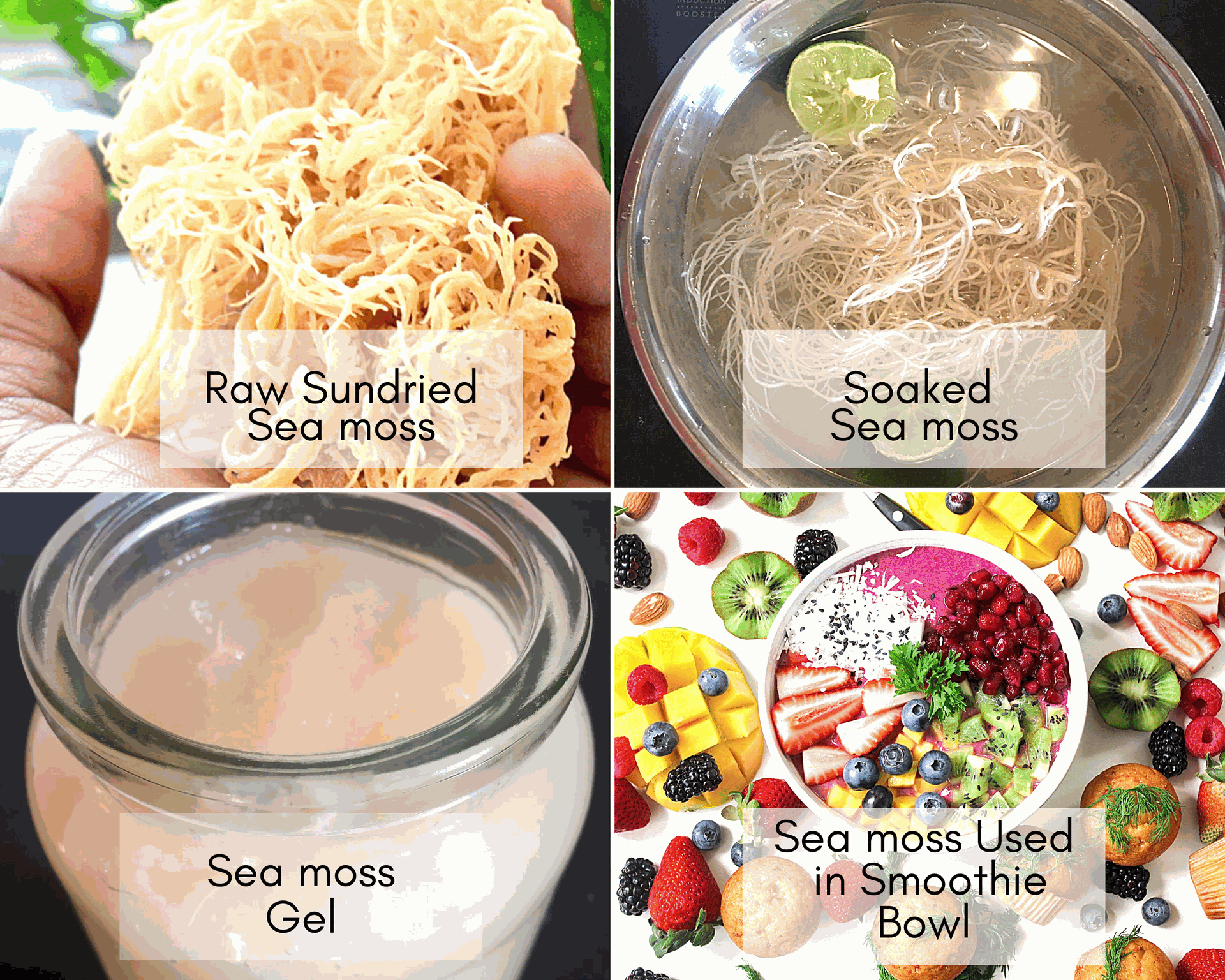Discover the numerous health benefits of sea moss in this comprehensive review. We will explore the scientific evidence behind the potential health benefits of sea moss, and discuss some of the downsides and risks associated with its consumption. Find out how to incorporate this nutrient-rich seaweed into your diet and reap the rewards of this superfood.
What is Sea Moss?

Sea moss, also known as Irish moss or red seaweed, is a type of marine algae that has been used for centuries as a food and medicine in various cultures around the world. In recent years, sea moss has gained popularity as a superfood that is rich in nutrients and bioactive compounds, and has been associated with a wide range of health benefits.
Sea moss belongs to the family of red seaweeds, which are known for their high content of carrageenan, a type of polysaccharide that is widely used as a food thickener and stabilizer. Sea moss has a gelatinous texture and a mild taste, and can be consumed in various forms, such as raw, dried, powdered, or as a supplement.
Sea moss is rich in a wide range of nutrients, including:
- Carbohydrates
- Collagen
- Protein
- Fiber
- Vitamins A, B, C, D, E, and K
- Minerals, such as iron, potassium, sodium, phosphorus, magnesium, calcium, zinc, sulphur, and iodine
- Phytochemicals, such as flavonoids, terpenes, and sulfated polysaccharides (carrageenan)
- Amino Acids, such as arginine, histidine, methionine, lysine, proline, leucine and glycine
Health Benefits of Sea Moss
Sea moss has been traditionally used for its potential health benefits, such as:
Boosting Immune Function

Sea moss contains several bioactive compounds that have been shown to have immunomodulatory effects, meaning that they can help regulate the immune system and improve its response to infections and diseases. For example, studies have shown that sulfated polysaccharides from sea moss can enhance the activity of immune cells, such as macrophages and natural killer cells, and increase the production of cytokines, such as interleukin-6 and tumor necrosis factor-alpha. [1]
Supporting Digestive Health

Sea moss contains a high amount of fiber, which is essential for digestive health and can help prevent constipation, bloating, and other gastrointestinal disorders. Additionally, sea moss is rich in carrageenan and prebiotics, which are substances that promote the growth of beneficial gut bacteria and improve the balance of the gut microbiome. Some studies have suggested that polysaccharides found in sea moss may also have anti-inflammatory effects on the gut and reduce the risk of inflammatory bowel diseases. [2,3]
Enhancing Skin Health

Sea moss is a rich source of antioxidants, such as vitamin C and flavonoids, which can help protect the skin from oxidative stress and premature aging. Additionally, sea moss contains several minerals, such as sulfur, zinc, and copper, that are essential for skin health and can promote collagen synthesis, wound healing, and skin hydration. Some studies have also suggested that sea moss may have anti-inflammatory effects on the skin and reduce the symptoms of skin conditions, such as acne, eczema, and psoriasis. [4, 5, 6]
Supporting Thyroid Function

Sea moss is one of the richest dietary sources of iodine, a trace mineral that is essential for the production of thyroid hormones. Thyroid hormones are involved in many physiological processes, such as metabolism, growth, and development, and their deficiency or excess can lead to various disorders, such as hypothyroidism or hyperthyroidism. Consuming sea moss can help prevent iodine deficiency and support the health of the thyroid gland. [7]
Other Potential Benefits
In addition to the above benefits, sea moss (red algae/seaweed) has been associated with other potential health benefits, such as:
- Anti-inflammatory effects
- Anti-viral effects
- Anti-cancer effects
- Anti-coagulant effects
- Anti-diabetic effects
- Anti-oxidant effects
Some studies have suggested that macroalgae are known producers of substances with bioactive properties, including anti-viral, antibacterial, antioxidant, and anti-inflammatory properties, among several others. In particular, red algae are rich in bioactive compounds such as polysaccharides, phenolic compounds, lipids, sterols, alkaloids, and terpenoids, conferring them antioxidant, antimicrobial, and anti-inflammatory activities, among others. [8, 9]
Downsides and Risks of Sea moss
Despite its potential health benefits, sea moss also has some downsides and risks that should be taken into consideration before its consumption. Some of the most important ones are:
Heavy Metal Contamination
Some sea moss can accumulate heavy metals, such as arsenic, lead, and mercury, from polluted seawater in various parts of the world, which can pose a health risk if consumed in high amounts. Therefore, it is important to choose high-quality sea moss that is harvested in clean unpolluted seawater such as in St. Lucia and the Caribbean islands.
Carrageenan Sensitivity
Carrageenan, a compound found in sea moss, has been associated with gastrointestinal inflammation and other health problems in some individuals. Although carrageenan is mostly removed during the extraction process of sea moss, some people may still be sensitive to its residual amounts. Therefore, it is recommended to avoid sea moss or products that contain carrageenan if you experience any digestive issues or allergies. (Source)
Interaction with Medications
Sea moss may interact with certain medications, such as blood thinners, thyroid hormones, and diabetes medications, due to its high content of iodine and other bioactive compounds. Therefore, it is important to consult with a healthcare provider before consuming sea moss if you are taking any medications or have a medical condition.
How to Consume and Use Sea Moss

If you decide to consume and use sea moss, there are several ways to do it, such as:
- Adding it to smoothies, juices, soups, or salads
- Using it as a natural thickener for sauces, stews, porridge, gravies, dips, desserts, or baked goods
- Taking it as a supplement in capsules, gummies, powders, or tinctures (liquid drops)
- Making sea moss gel for direct application to skin such as facial masks, or treatment of minor burns or scrapes and scratches
- Using it for making homemade skin care recipes
- Incorporating it into skin care products such as cleansers, body scrubs, clay masks, lotions, shampoos, or conditioners
How to Prepare Sea Moss
To prepare sea moss for consumption and use, you need to soak it in water for several hours until it softens and expands. Then, you can rinse it and blend it with spring water or other ingredients to make a gel-like substance that can be stored in the refrigerator for up to two weeks. It can also be poured into ice trays and kept frozen for up to 3 months and it is a versatile, convenient and easy way to use it for everyday consumption.
Conclusion
Sea moss is a nutrient-dense seaweed that has been associated with various health benefits, such as boosting immune function, supporting digestive health, enhancing skin health, and supporting thyroid function. However, sea moss also has some downsides and risks, such as heavy metal contamination, carrageenan sensitivity, and interaction with medications. Therefore, it is important to choose high-quality sea moss harvested in clean unpolluted seawater, consume it in moderation, and consult with a healthcare provider if you have any health concerns or take any medications.
References
1. Sharmin Suraiya et al., “Immunity boosting roles of biofunctional compounds available in aquafoods: A review”, (2022) https://www.sciencedirect.com/science/article/pii/S2405844022008350
2. Barbara Borsani et al., “The Role of Carrageenan in Inflammatory Bowel Diseases and Allergic Reactions: Where Do We Stand?” (2021) https://www.ncbi.nlm.nih.gov/pmc/articles/PMC8539934/
3. Natalya N. Besednova et al., “Extracts and Marine Algae Polysaccharides in Therapy and Prevention of Inflammatory Diseases of the Intestine” (2020), https://www.ncbi.nlm.nih.gov/pmc/articles/PMC7345783/
4. Ji Hye Kim et al., “Beneficial Effects of Marine Algae-Derived Carbohydrates for Skin Health” (2018), https://www.ncbi.nlm.nih.gov/pmc/articles/PMC6266229/
5. Valentina Jesumani et al., “Potential Use of Seaweed Bioactive Compounds in Skincare-A Review,” Marine drugs (2019), https://www.ncbi.nlm.nih.gov/pmc/articles/PMC6950024/.
6. Adriana P. Januário et al., “Red Seaweed-Derived Compounds as a Potential New Approach for Acne Vulgaris Care” (2021) https://pubmed.ncbi.nlm.nih.gov/34834345/
7. Peter P.A. Smyth, “Iodine, Seaweed, and the Thyroid” (2021), https://www.ncbi.nlm.nih.gov/pmc/articles/PMC8077470/
8. Zhiwei Liu et al., “Anti-Cancer Activity of Porphyran and Carrageenan from Red Seaweeds”, (2019) https://www.ncbi.nlm.nih.gov/pmc/articles/PMC6930528/
9. Rayapu et al., Marine Algae as a Potential Source for Anti-diabetic Compounds - A Brief Review”, (2021) https://www.ingentaconnect.com/content/ben/cpd/2021/00000027/00000006/art00004
FDA DISCLAIMER:
The statements made within this website have not been evaluated by the Food and Drug Administration. These statements and the products of this company are not intended to diagnose, treat, cure or prevent any disease.


The Health Benefits of Sea Moss: A Comprehensive Review